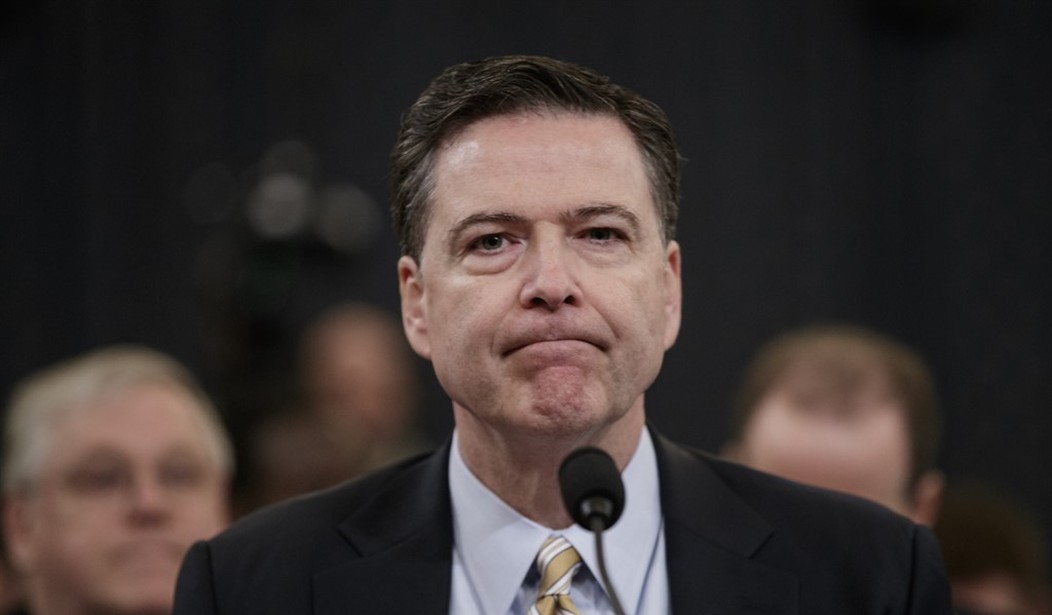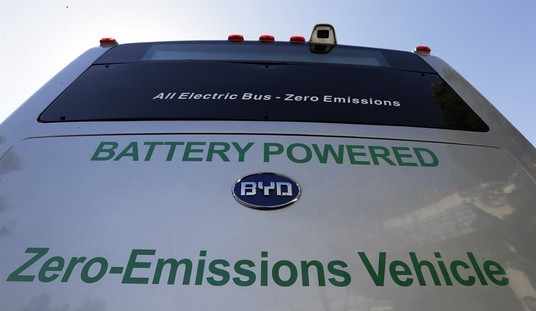As of April 11th, at least. The key detail from tomorrow’s opening statement, in which Comey recounts a phone call with Trump on March 30th:
Then the President asked why there had been a congressional hearing about Russia the previous week – at which I had, as the Department of Justice directed, confirmed the investigation into possible coordination between Russia and the Trump campaign. I explained the demands from the leadership of both parties in Congress for more information, and that Senator Grassley had even held up the confirmation of the Deputy Attorney General until we briefed him in detail on the investigation. I explained that we had briefed the leadership of Congress on exactly which individuals we were investigating and that we had told those Congressional leaders that we were not personally investigating President Trump. I reminded him I had previously told him that. He repeatedly told me, “We need to get that fact out.” (I did not tell the President that the FBI and the Department of Justice had been reluctant to make public statements that we did not have an open case on President Trump for a number of reasons, most importantly because it would create a duty to correct, should that change.)
In a separate phone call 12 days later, Trump followed up by asking Comey again why he couldn’t say publicly that Trump wasn’t personally under investigation. Comey told him that the White House could talk to the DOJ about that. But on the substance, the claim in Trump’s termination letter to Comey is correct even by Comey’s own admission: On at least three occasions, Comey confirmed that Trump wasn’t being investigated for collusion himself. That’s a superb headline for a White House that was understandably nervous about tomorrow’s testimony.
There’s more, though. In the interest of letting readers dive in ASAP, I’m posting a link to the prepared remarks now and will update with further highlights below. Stand by.
Update: The first time Comey told Trump that he wasn’t being investigated was January 6th, during the same briefing in which he went over the infamous and dubious Russian “dossier” with him. Trump later assured Comey on March 30 that he was, um, never involved with Russian hookers, the most sensational claim from the “dossier.”
An interesting aside from Comey: He says he began immediately memorializing his meetings with Trump in memos after that January 6 meeting, something he’d never felt the urge to do after meeting with Obama.
Update: Comey’s account of the fateful White House dinner between him and Trump confirms the substance of press accounts that Trump asked for “loyalty” and it made Comey uneasy:

Comey answered by promising honesty, to which Trump allegedly said he wanted “honest loyalty.” Which are, ah, two different things. But Comey didn’t push it because the whole thing was … really awkward.
Note the point about “patronage” too. Democrats will argue tomorrow as evidence that Trump was hinting early that Comey’s job depended upon compliance with Trump’s wishes on the Russia probe, an implicit threat pointing to obstruction of justice.
Update: In Comey’s own words, here’s how Trump allegedly leaned on him about going easy on Mike Flynn:

Ed argues that that’s not obstruction. I agree, and that’s why Rubio and Angus King zeroed in this morning on the distinction between “asking” someone to influence an investigation and “pressuring” or “directing” them. It may be that Trump never went beyond a request in leaning on his intel people to go easy on Flynn or the Russia probe, which makes the obstruction claim harder. I think Comey will argue tomorrow, though (or at least his Democratic supporters), that the events here need to be viewed in succession, not isolation: Trump asked for patronage in January, then asked Comey to let Flynn go in February, then fired him in May. Was it really a “request” if Comey was punished for noncompliance? And why, per Comey, did Trump insist on Sessions and Jared Kushner leaving the room before he made the “request” about Flynn?
Another point in Trump’s favor, though: Comey goes on to say that he understood Trump to be asking him to go easy on Flynn for making false statements to the feds about his chat with the Russian ambassador, not to go easy on the Russiagate probe altogether.
As for why he didn’t tell anyone at the DOJ about what Trump had said, he assumed (correctly) that Sessions would soon have to recuse himself from the Russia probe and there was no permanent deputy AG confirmed yet. Fair enough, but why didn’t he tell Rod Rosenstein on day one about the conversation once Rosenstein had been confirmed?
Update: Comey suggests again in describing their March 30 phone call that Trump wasn’t trying to derail the Russiagate probe altogether: “The President went on to say that if there were some ‘satellite’ associates of his who did something wrong, it would be good to find that out, but that he hadn’t done anything wrong and hoped I would find a way to get it out that we weren’t investigating him.” He was concerned with the political “cloud” over his own head, it seems, not with Paul Manafort or Carter Page or whoever, and that it was “affecting his ability to make deals for the country.” Does that mean he was looking to lift sanctions on Russia or reach some other grand bargain with Moscow? Those are the only sorts of “deals” affected by the Russiagate thing.
Seems like Trump’s biggest mistake in all of this was making that request of Comey about Flynn. If not for that, all there would be against him would be that awkward demand for “loyalty” at their dinner, which is inappropriate to ask of a law-enforcement officer but nothing like obstruction of justice.
Update: A colorful detail from their last phone call on April 11. Again, this is Trump asking Comey to say publicly that he’s not under investigation personally:

What did he mean by “that thing”? Was he referring to his original request for loyalty at their dinner together? Trump may have misunderstood Comey’s reply about “honest loyalty” at the time that he was willing to follow instructions from the president. Or was “that thing” a reference to the letter Comey sent about Emailgate just before Election Day that had every Democrat in the country demanding (for awhile) that Comey be fired, which Trump ignored? I.e. Trump’s been loyal in letting him keep his job even though much of the public disagreed.
It was nearly another month after that before Comey was fired, and yet he claims he and Trump never spoke again. Weird that there was no catalyzing exchange between them that finally pushed Trump over the edge.
In sum, is this the takeaway?
Reading that statement, it sounds like Trump fired Comey for refusing to say Trump wasn't under investigation–which he actually wasn't
— Rich Lowry (@RichLowry) June 7, 2017








Join the conversation as a VIP Member